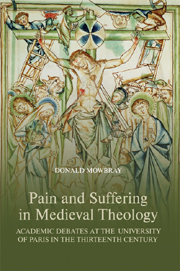 Pain and Suffering in Medieval Theology
Pain and Suffering in Medieval Theology Book contents
- Frontmatter
- Contents
- Acknowledgements
- Abbreviations
- Dedication
- Introduction
- 1 Thirteenth-Century Theological Ideas about Human Pain and Suffering and the Passion of Christ
- 2 Gendering Pain: Theological Ideas about Female and Male Suffering
- 3 Pain as a Restorative Power: Voluntary Suffering and Satisfaction for Sin
- 4 The Intellectual Development of Limbo: Pain, Children and Original Sin
- 5 Anima Separata: Masters of Theology and the Controversy surrounding the Suffering of the Separated Soul
- 6 Defining the Corporeal: Suffering in Hell according to Masters of Theology at Paris, c.1230–c.1280
- Conclusion
- Select Bibliography
- Index
4 - The Intellectual Development of Limbo: Pain, Children and Original Sin
Published online by Cambridge University Press: 12 September 2012
- Frontmatter
- Contents
- Acknowledgements
- Abbreviations
- Dedication
- Introduction
- 1 Thirteenth-Century Theological Ideas about Human Pain and Suffering and the Passion of Christ
- 2 Gendering Pain: Theological Ideas about Female and Male Suffering
- 3 Pain as a Restorative Power: Voluntary Suffering and Satisfaction for Sin
- 4 The Intellectual Development of Limbo: Pain, Children and Original Sin
- 5 Anima Separata: Masters of Theology and the Controversy surrounding the Suffering of the Separated Soul
- 6 Defining the Corporeal: Suffering in Hell according to Masters of Theology at Paris, c.1230–c.1280
- Conclusion
- Select Bibliography
- Index
Summary
Some types of pain and suffering were related to the presence of sin and guilt, as was highlighted in the previous chapter. Much of this hinged on the presence of the human will and the suffering which the will deserved for its misguided actions. But how were the masters to understand the suffering of those who lacked free will? The masters turned their attention to the fate of children who had died only with the stain of original sin. This caused problems for them on two levels. First, original sin did not involve the use of the individual's free will and it was not clear which punishments were deserved by those who only possessed this sin. Second, the masters were faced with an authority in Augustine, who advocated the damnation of unbaptised children. The masters used their ideas about pain and suffering to explain Augustine's position and defend their own. The link between individual sin and the experience of pain in the afterlife necessitated a development in the topography of the other world. This development culminated in the construction of limbo in both its physical and experiential aspects.
The fate of infants: historical and theological background
Augustine, Pelagianism and Origenism
The thirteenth century inherited centuries of debates which focused on what happened to children when they died. The fate of infants who died unbaptised was a particularly hotly debated issue in the final years of the fourth century and the beginning of the fifth century.
- Type
- Chapter
- Information
- Pain and Suffering in Medieval TheologyAcademic Debates at the University of Paris in the Thirteenth Century, pp. 81 - 103Publisher: Boydell & BrewerPrint publication year: 2009


